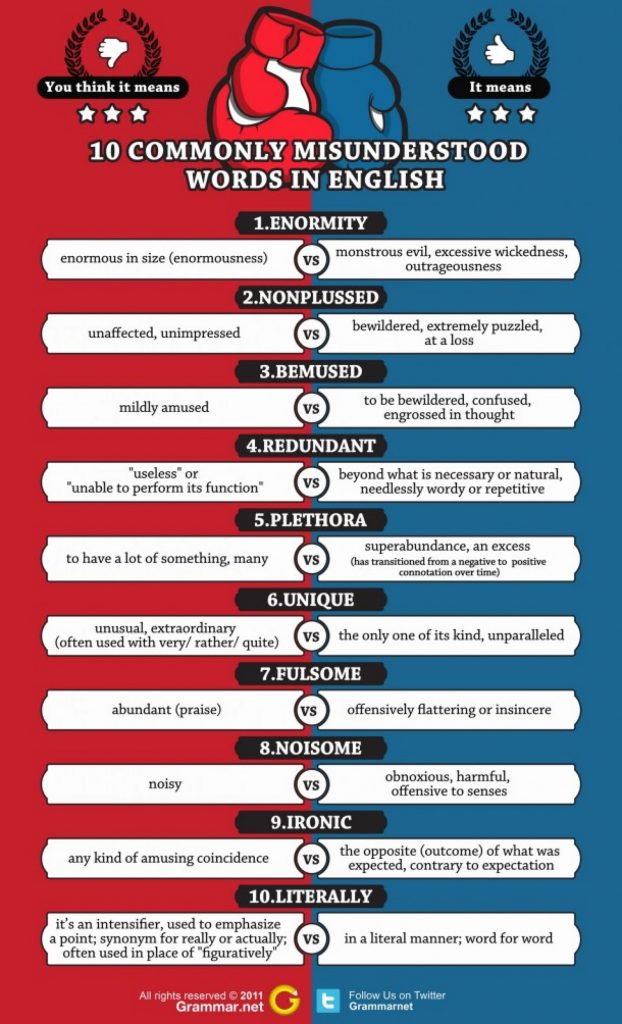Commonly misunderstood words in English Posted by Gabriele on Dec 18, 2014 in English Language, English Vocabulary
Take a look at this great infographic from Gammar.net. This is a wonderful list of 10 very commonly misunderstood words in English. To help you better understand these words I have used all the words from this infographic in sentences below, in order to put them in context.
1. The enormity of the villain in the story was extremely scary.
2. Jill looked nonplussed after talking to Abe about what went wrong in their failed experiment.
3. Because the museum was so big I walked around bemused in it for hours.
4. The teacher asked her students to reread their papers and make their writing less redundant.
5. When a plethora of freshman showed up at the concert, most of the older students decided to leave.
6. This picture is quite unique; it is the only one that exists of my two grandparents together.
7. Once she started to read fulsome comments about herself in the newspaper article she stopped reading it altogether.
8.Where is that noisome smell coming from?
9. Ironically Dale was not accepted to attend the school his father had worked at for 10 years.
10. Murray copied the text literally, without errors.
All of these words are advanced vocabulary words. If you are a beginning student, don’t worry if some of these words are too hard for you to comprehend and use right now. Here are a few more words (for all levels of ESL learners) that are commonly misunderstood and mistaken in English to help round out this discussion.
allot – This verb means ‘to distribute something’ or ‘give it out.’ It is often confused with the word a lot, which means ‘many.’
Example: The hospital allotted each nurse a new set of clothes.
complementary – This means ‘something, or some people, that go together well;’ they complete each other. At times this word is confused with the word complimentary, which means that something was ‘given free of charge or as a gift.’
Example: Dinner and a movie are complementary for a nice night out on the town.
forego – This word means ‘to go before something else.’ It is often confused with the word forgo, which is a more common word in English, and means ‘to do without.’
Example: After reading the foregoing paragraph, she decided to skip the rest of the chapter.
regimen – This word refers to ‘a system of order’ or ‘a schedule for giving out medication.’ It can be confused with the word regiment, which is ‘a military unit or group of military personnel.’
Example: The sick woman was ordered to complete a regimen of antibiotics.
site – This word means ‘a place’ and is often confused or mistakenly interchanged with the word cite, which means ‘to quote words or sentences from a book or other literary source.’
Example: The site of the massacre is now a memorial.
It is easy to misunderstand words when learning a new language, especially when they look and sound like a word with another meaning. Hopefully this post has helped you straighten out any misunderstandings you have of all the words we covered here.

Build vocabulary, practice pronunciation, and more with Transparent Language Online. Available anytime, anywhere, on any device.
About the Author: Gabriele
Hi there! I am one of Transparent Language's ESL bloggers. I am a 32-year-old native English speaker who was born and raised in the United States. I am living in Washington, DC now, but I have lived all over the US and also spent many years living and working abroad. I started teaching English as a second language in 2005 after completing a Master's in Applied Linguists and a Certificate in English Language Teaching to Adults' (CELTA). Since that time I have taught ESL in the United States at the community college and university level. I have also gone on to pursue my doctorate in psychology and now I also teach courses in psychology. I like to stay connected to ESL learners around the world through Transparent Languages ESL Blog. Please ask questions and leave comments on the blog and I will be sure to answer them.




